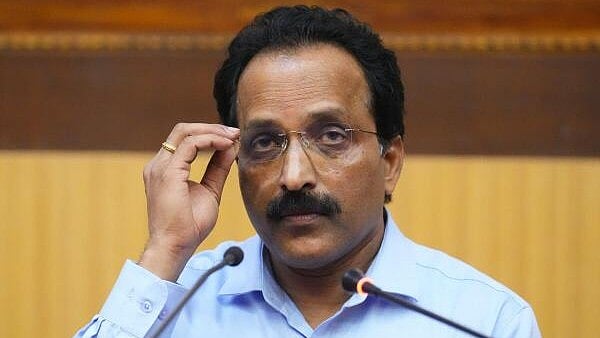
Indian Space Research Organisation (ISRO) Former Chairman S Somanath
Credit: PTI File Photo
Bengaluru: Former chairman of Indian Space Research Organisation (ISRO) Dr S Somanath advised the graduating students of Indian Institute of Management Bangalore (IIMB) to be aware of the impact of technology on life and society.
Addressing the 50th annual convocation of the premier institute on Friday, Somanath said, “The future is faster than you think, and the world’s biggest problems are its biggest opportunities as well. We can solve the biggest challenges with the help of technology, at the same time being aware of its impact on life and society.”
“Technological evolution is now global and exponential, with sensors, AI, robotics, virtual reality, blockchain, etc. With all these, we are reinventing the business models,” he said.
“In the coming years, a robot may replace other devices, becoming very powerful by translating commands to actions. Digital connectivity and computational power will surely increase. Scarcity will give way to abundance - in terms of power, water, healthcare, learning, resources, expertise, etc.,” he said.
“We see poverty and famine already coming down. Connectivity between people and everything else will increase; AI and humans will collaborate; research domain will broaden; there will be advanced diagnostics, plus sensory perception of human beings will be enhanced,” he felt.
“Other domains of work to face disruptions include digital medicine, electrical mobility, technology with low carbon footprint, green hydrogen initiatives, quantum sensing, sun-powered chemistry, biomedical interventions, and more,” he explained.
Speaking about the impact of such disruption, he pointed out that the rate of population increase is coming down.
“This may benefit developing nations. But not so in the case of developed ones as knowledge and skill transfer will face a challenge. Nations will also face migration issues, climate change burdens and economic disparity affecting employment, leading to revolt within societies and creating disturbances for states and government.”
He cautioned, “Institutions will weaken new democracies may emerge. There will be challenges of great nature for which we do not have the answer. We can only solve all these challenges by working with technology.”
“As a country, we are still adopting technology, whereas we should create the same. For that, we need more institutions working towards creating professionals who can work for the cause. I wish you all become leaders who help make this transition in the years to come,” he remarked.
Dr Devi Shetty, chairperson, Board of Governors, IIMB, pointed out that the ability of technology to change the world is overestimated in the short
run and underestimated in the long run.
He advised, “AI is important. But it is yet to be seen how much it will transform the world. You need to understand technology well and gauge how much the estimated technological growth will materialize.”
A total of 798 students graduated, and eight students received gold medals.
